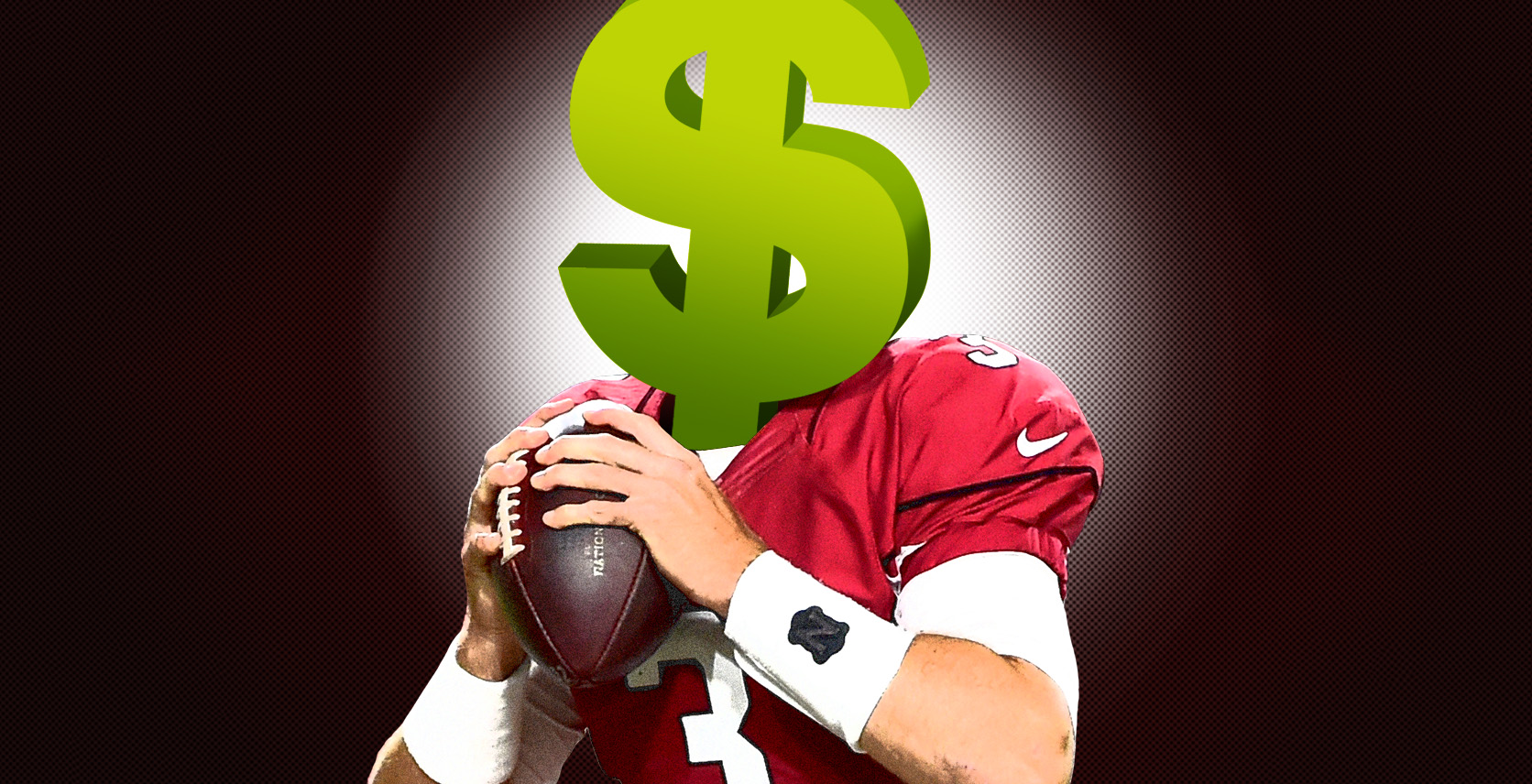Are Daily Fantasy Sports Ruining Our Love for the Game?
“The secret is: don’t be the sucker,” I told my friend Ben one Saturday afternoon this fall, as I absent-mindedly scrolled through a seemingly endless list of wide receivers I had never heard of. He looked at me quizzically. “The sucker, the patsy, you know,” I said impatiently. “What’s the thing Warren Buffet said? ‘If you’re at the poker table and you don’t know who the sucker is, it’s you.’”
I went back to my fantasy draft, trying to decide if adding AJ Green to my roster against the Bills was the move of a genius or a patsy. “Isn’t the writer joining fantasy football for an article probably the sucker?” Ben asked, but I ignored him. Ben knows more about football than me and is better at math, but he doesn’t have the killer instinct needed for high-stakes fantasy action. I entered my Paypal account number and locked in my investment: $10. Then I opened a new tab, carefully typed “how to play fantasy football,” and hit enter.
***
IF YOU ARE A HUMAN BEING WITH the slightest interest in sports, you have felt the behemoth that is daily fantasy sports trampling through 2015, like the harbinger of some terrifying new age of fandom. There are commercials between every break in play during a football broadcast, ads that follow you across the internet, “sponsored content” baked into columns and podcasts by sports journalists eager to siphon off a few drops from the rushing geyser of cash that is the fantasy sports behemoth. (This column isn’t one of them, obviously; I wasted my own money).
Fantasy has been around since the 1980s — when Rotisserie Leagues were created with the goal of providing the mildest form of fun possible between awkward coworkers — but the game only reached its current, perfect form in 2009, when FanDuel became the first company to offer daily fantasy. Like traditional fantasy, the concept is simple: draft a team of players and use their real-world stats to earn points. Get more points than your opponents and you win. But by freeing fans from a season-long commitment, promising big cash prizes, and offering a shiny, endorphin-producing interface, daily fantasy has turned a casual hobby into an omnivorous moneymaking machine.
Fanduel and DraftKings, the two companies that control the market, have grown into billion-dollar businesses in an unregulated market that exists because of a loophole that says that fantasy, unlike gambling, is a game of skill. Both companies boast about their massive prizes. One FanDuel commercial claims they pay out $75 million a week, with testimonials from average looking dudes who claim they’ve become millionaires. “It’s like the best adrenaline rush ever,” says a tired-looking man in a button-down who seems, frankly, like an unlikely connoisseur of adrenaline rushes.
The leagues promise sports nerds the ultimate dream: the monetization of fandom. I figured it was time to get in on the action.
***
WHEN I CREATED MY FANDUEL ACCOUNT, I’d unthinkingly gone with some modest combination of first initial and last name. Now, looking at my competition in the “$250K Sun NFL BIG $10 Double Up,” I found myself pitted against people with names like Smackers34, Coxsackle, and Wallydogg. I imagined a grown man who called himself “Wallydogg.” What kind of time did he have on his hands, absent friends and loved ones? A man without any sense of personal dignity, without anything to lose, that man could be a dangerous opponent.
Using a mixture of reasoned analysis, Internet research, and dumb guessing, I selected my team. That Sunday, roster intact, I went to the bar with Ben to watch the games. Within minutes, I was putting up points. After just a few downs, with a couple of nice Carson Palmer completions and a turnover caused by my Houston defense, I was set to double my money. I felt a surge of adrenaline. Was the button-down shirt guy right?
Over the next three hours, my eyes toggled between the three screens playing the games and my phone, where a tiny stick figure representing my imaginary team inched its way up or down the imaginary playing field. My rooting interests became entirely warped, devoted to individual players and specific outcomes. I was hoping the Bears would advance downfield, but just far enough so they’d be forced to kick a field goal (3 points). I desperately hoped for a Cardinals touchdown, but only a passing touchdown and only if that passing touchdown went to Larry Fitzgerald (6 points). The sensation was like watching an episode of Game of Thrones, ignoring the major plotlines, and concentrating exclusively on the actions of a young squire in the background, fervently rooting for him to eat a ham hock or button his tunic or get roasted by a dragon (10 points). It was thrilling.
My early lead quickly evaporated. By the late afternoon games, as the Packers refused to give Eddie Lacy the ball, it was clear I had lost while Ben had his head in his hands, occasionally peeking up to check on the dismal production of some unknown San Diego running back he had foolishly chosen.
The truth, of course, is that if you are someone who looks at the world of daily fantasy sports and thinks, “I wonder if I’m the sucker?” it’s already too late. The daily fantasy world has the same taxonomy as the poker world, with rapacious professionals, the sharks, snacking on minnows like me and occasionally landing a whale, the big-spending amateurs who have more money than sense. The sharks use statistical modeling to figure out their teams, and then use software to manage their hundreds of line-ups. According analysis in a Bloomberg article, the top 100 DraftKing players enter 330 winning lineups per day. The 20,000 other players, the minnows, won just 13 times. If you are someone choosing a line-up because you have a hunch that Riley Cooper might have a good game, you don’t have a chance.
Which isn’t to say the game can’t be fun. At the bar, I sat watching the Chicago Bears-Detroit Lions game go into overtime, thrilled as two terrible teams I didn’t care about did battle in a meaningless midseason game. It’s obvious why ESPN, Fox, MLB, the NFL and NFL owners Jerry Jones and Robert Kraft are all investors in FanDuel or DraftKings. The synergy is perfect: more people watching meaningless games means more ad revenue and more eyeballs on those fantasy commercials, which creates more fantasy players watching more meaningless games, et cetera, ad infinitum, in a glorious cycle that enriches everyone involved and, at last, makes it perfectly clear where the average fan sits in the ecosystem of big-money professional sports.
We are, of course, the suckers.










